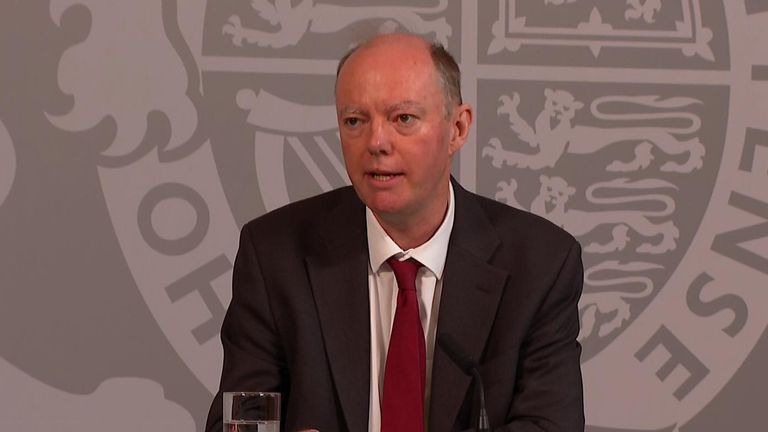The UK could soon see 49,000 new cases of coronavirus every day unless action is taken to drive down the current rate of infection, the government’s chief scientific adviser has warned.
Sir Patrick Vallance told a Downing Street briefing that the number of new COVID-19 cases was doubling roughly every seven days.
Live coverage of the latest coronavirus news and updates
The briefing comes as Prime Minister Boris Johnson considers tightening measures to stop the spread of the virus.
Sir Patrick said that if the current growth in cases continued unabated, the UK would be seeing around 50,000 coronavirus cases a day by the middle of October.
Sir Patrick, who appeared alongside England’s chief medical officer Professor Chris Whitty, said that this would then translate to “200-plus deaths a day” by mid-November.
“The challenge therefore is to make sure the doubling time does not stay at seven days,” he said.
“There are already things in place which are expected to slow that, and to make sure that we do not enter this exponential growth and end up with the problems that you would predict as a result of that.
“That requires speed, it requires action and it requires and it requires enough in order to be able to bring that down.”
Sir Patrick said there had been an increase in cases in every age group and dismissed the suggestion that the uptick in cases was down to more tests being carried out.
He told the briefing that around 8% of the population, approximately three million people, have been infected with the virus and therefore have antibodies.
“It means the vast majority of us are not protected in any way and are susceptible to this disease,” Sir Patrick added.
Professor Whitty said there were now “significant rates of transmission” in parts of the UK.
“What we’ve found is, as we go through in time, anywhere that was falling is now moving over to beginning to rise and then the rate of rise continues in an upwards direction,” he told the briefing.
“So, this is not someone else’s problem, this is all of our problem.”
And he suggested that restrictions on people’s social lives may need to be introduced, telling the briefing that trying to “break unnecessary links between households” was important because “that is the way in which this virus is transmitted”.
“We all know we cannot do this without some significant downsides,” Professor Whitty continued.
“This is a balance of risk between if we don’t do enough the virus will take off – and at the moment that is the path we’re clearly on – and if we do not change course we are going to find ourselves in a very difficult problem.”
Daily confirmed cases have returned to levels last seen in May.
And the R number, which shows the spread of the virus, is now between 1.1 and 1.4.
Professor Whitty warned that infection rates are “heading in the wrong direction” – and the country is at a “critical point” in the pandemic.
About 13.5 million people across the UK are currently facing some form of local restrictions.
The PM has said he does not want to put the country into a second national lockdown – but he has warned that he may need to “intensify things” to bring the rate of infections down.
It is understood that Downing Street is looking at introducing temporary nationwide restrictions to try and “short-circuit” the virus.
However, government figures have stressed the plans being drawn up stop short of the full national lockdown that was introduced back in March.
Proposals being worked up could see essential travel to schools and workplaces continuing, but restaurants and bars shut – or perhaps operating on restricted hours – with different households told not to mix at all.
The restrictions could be put in place for two weeks, but the timing and duration has yet to be finalised.
There has been speculation of such a lockdown taking place around the time of school half-term in October.

